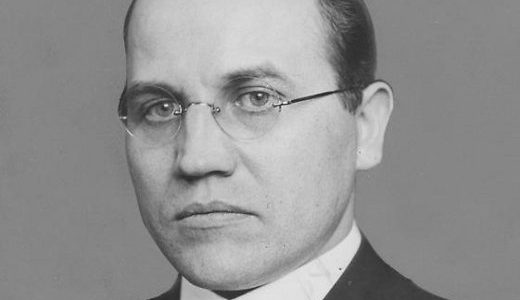Note: the views expressed below are mainly those of BNS and 15min.lt and not necessarily those of the Lithuanian Jewish Community.

The Vilnius city council Wednesday approved further deliberation on a proposal to rename the alley named after the controversial diplomat and military officer Kazys Škirpa located in the center of the capital.
A final decision will come out of the next council meeting in two weeks. People close to Vilnius mayor Remigijus Šimašius proposed calling it Tricolor Alley.
The mayor said this decision should be adopted in view of Škirpa’s anti-Semitism.
“This man had a plan to get rid of Lithuanian citizens, to send the Jews away, to rub them out when the chance arose. Clearly such a person who sowed discord, who encourages Holocaust activism, should truly not be honored in the city of Vilnius,” Šimašius told reporters before the council meeting Wednesday.
Proposal author Renaldas Vaisbrodas said the Lithuanian Activist Front led by Škirpa raised anti-Semitism to a political level and this encouraged some Lithuanian residents to take part in the Holocaust.
“This issue is complicated and raises a lot of emotions,” he said at the council meeting.
The motion to put the measure on the agenda for the next sitting of council received fifteen votes in favor, thirteen against and two abstentions, with another five council members not present during voting.
Protest
Proponents of Škirpa staged a protest outside the municipal building and said Škirpa’s contribution to the foundation and consolidation of the independent state should be taken into consideration. On January 1, 1919, Škirpa raised the Lithuanian flag, the tricolor, on Gediminas Hill.
“Let’s not allow the desecration of people who sacrificed their lives for Lithuania and freedom. I will stand so the first military volunteers are not desecrated,” 70-year-old Kasparas Genzbigelis told BNS.
“This person has done so much for Lithuania and renaming the alley named after him would be a show of great disrespect both to him and to the state,” 23-year-old protestor Tomas Kulešius said.
He also said there was no evidence Škirpa contributed in any way to the Holocaust.
“There are no direct orders [by] Škirpa to exterminate Jews or to contribute to the Holocaust,” he claimed.
Lithuanian Jews Satisfied
Lithuanian Jewish Community chairwoman Faina Kukliansky told BNS after the vote she was satisfied with the result.
“I am satisified with the result, but I am also very much because this issue has been researched for so many years now and there is much literature about it. I have confidence in this council,” Kukliansky said.
She said streets should only be named after people who merit it, not those who arouse controversy.
“The council at this time is not determining Škirpa’s guilt, they’re just considering the question of the street name. To name a street after someone, that person must be deserving of the honor. Naming a street after a controversial and divisive figure is not appropriate and there is no need to argue about it,” she said.
Kukliansky said she and the Jewish community are not devaluing Škirpa’s contribution to the founding and fortifying of the independent state of Lithuania.
Full text in Lithuanian here.


